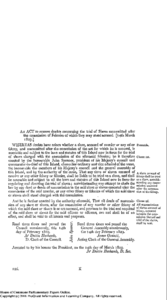Full Transcript
WHEREAS doubts have arisen whether a slave accused of murder or any other felony, and manumitted after the commission of the act for which he is accused, is amenable and subject to the laws and statutes of this Island now in force for the trial of slaves charged with the commission of the aforesaid felonies; be it therefore enacted by the Honourable John Spooner, President of His Majesty’s Council, and Commander in Chief of this Island, chancellor ordinary and vice admiral of the same, the honourable the members of his Majesty’s Council and the General Assembly of this Island, and by the authority of the same, That any slave or slaves accused of murder, or any other felony or felonies, shall be liable to be tried as a slave, and shall be amenable and subject to all the laws and statutes of this Island now in force for regulating and directing the trial of slaves; notwithstanding any attempt to elude the law by any deed or deeds of manumission to the said slave or slaves executed after the commission of the said murder, or any other felony or felonies of which the said slave or slaves shall stand charged with the commission.
And be it further enacted by the authority aforesaid, That all deeds of manumission of any slave or slaves, after the commission of any murder or other felony of which the said slave or slaves is or are accused, and previous to the trial and acquittal [2] of the said slave or slaves for the said offence or offences, are and shall be of no effect, and shall be void to all intents and purposes.
Read three times, and passed the Council unanimously, this 14th day of February 1809. Jos Dottin Husbands, D. Clerk of the Council.
John Spooner.
Read three times, and passed the General Assembly unanimously, the 14th day of February 1809. James Grasett, Acting Clerk of the General Assembly.
Assented to by his Honour the President on the 14th day of March 1809. Jos Dottin Husbands, D. Sec.
Date
Location
Citation
Download Original
Images published from the ProQuest House of Commons Parliamentary Papers product (HCPP) with permission of ProQuest LLC. Further reproduction is prohibited without permission.
